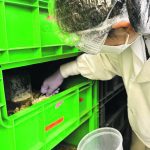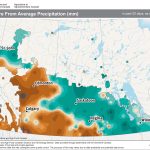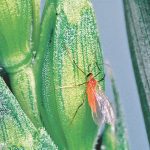The country is known for its meat-loving culture, but triple-digit inflation and a recession has forced belt tightening
BUENOS AIRES (Reuters) — Argentines, famed for steakhouses, sprawling cattle ranches and asado barbecues, are consuming less beef than ever, forced to tighten their belts by triple-digit inflation and a recession. Beef consumption is down almost 16 per cent this year in the South American nation, where beef has always been an essential part of […] Read moreNews

Firm wants to turn insects into livestock feed
A protein facility planned for Saskatchewan is expected to take black soldier fly opportunities to the next level
Sustainable protein for livestock feed commonly brings to mind pulses and other crops. A facility coming to Saskatchewan plans to make livestock feed from black soldier flies. In late June, agricultural technology firm NRGene Canada announced that its North American Insect Centre in Saskatoon will open July 30. The facility was developed in collaboration with […] Read more
European Union’s manure mathematics frustrate farmers
Strict regulations restrict how producers can use nitrogen fertilizer, depending on the form it takes when applied
Trucks show up at Han Langeler’s dairy farm in the Netherlands each spring and haul some of the cow manure up to 150 kilometres away. There, it is spread on fields in an area with fewer livestock farms than Langeler’s area near Aalten, near the German border. Langeler then buys nitrogen fertilizer to top up […] Read more
Numbers confirm June colder, wetter than average
The number of days in June when daytime highs made it past 30 C show the unseasonal weather. Using only the main reporting stations from each province, Winnipeg was the only location to record a day above 30 C, when the daytime high hit 30.4 C on June 24. The warmest days in all other […] Read more
Canfax Report
Fed price declines From highs in early June, fed cattle prices have dropped $8.50 per hundredweight. For most of this year, fed cattle prices followed a similar trend to last year. Last week, dressed sales were reported from $428-$429 per hundredweight delivered. There has been a significant basis shift over the past month. In early […] Read more

Research finds a safer way to decontaminate eggs
A new method that has been developed at the University of Saskatchewan promises decontamination with less damage
Researchers at the University of Saskatchewan say a technique used for cleaning swine barns has led them to an effective method for decontaminating eggs. The method uses water and electricity to create engineered water nanostructures (EWN), which clean the eggs without damaging the cuticle, the natural outer coating that seals the egg. This reduces the […] Read moreSoil scientist wins award
Ag Notes Jeff Schoenau, a University of Saskatchewan professor and Ministry of Agriculture Strategic Research Program Chair in Soil Nutrient Management, is the first recipient of the Les Henry Award. Henry, a Saskatchewan soil scientist in and professor emeritus at the U of who died earlier this summer, selected Schoenau in April. The award recognizes […] Read more

Ample precipitation sets stage for wheat midge
Conditions favourable to wheat midge development should prompt farmers to closely monitor their fields
Plentiful precipitation over much of the Prairies has created near-perfect conditions for wheat midge, which may emerge later this month and into July. Wheat midges overwinter in the soil as fairly mature larvae and emerge as adults when the crop is heading, said John Gavloski, an entomologist with Manitoba Agriculture. “Now, if you have your […] Read more
Sask. to restrict wild boar farms
REGINA — Saskatchewan has placed a moratorium on new wild boar farms, effective Jan. 1, 2025. It also requires all existing wild boar operations to be licensed and inspected by that time. The move comes after the regulations developed under the New Animal Control Act take effect. The government had announced two years ago that […] Read more

Global yields have not kept up with increasing demand
Sluggish production blamed on adverse weather conditions and high input costs that lead to reduced fertilizer use SASKATOON — Rising demand and below-trend yields is leading to a tightness in global supply of the major crops, says one of the world’s largest crop input suppliers.The global stocks-to-use ratio for the major crops, excluding China, has […] Read more




